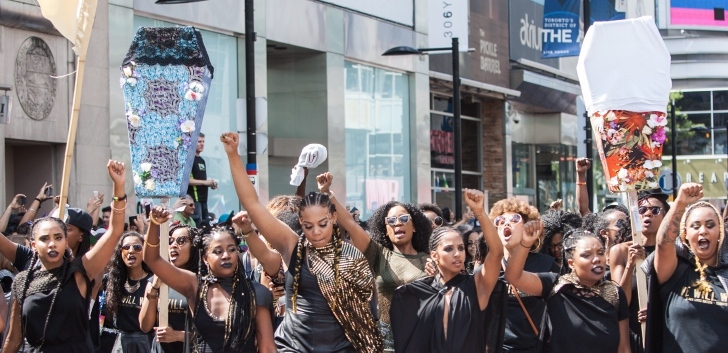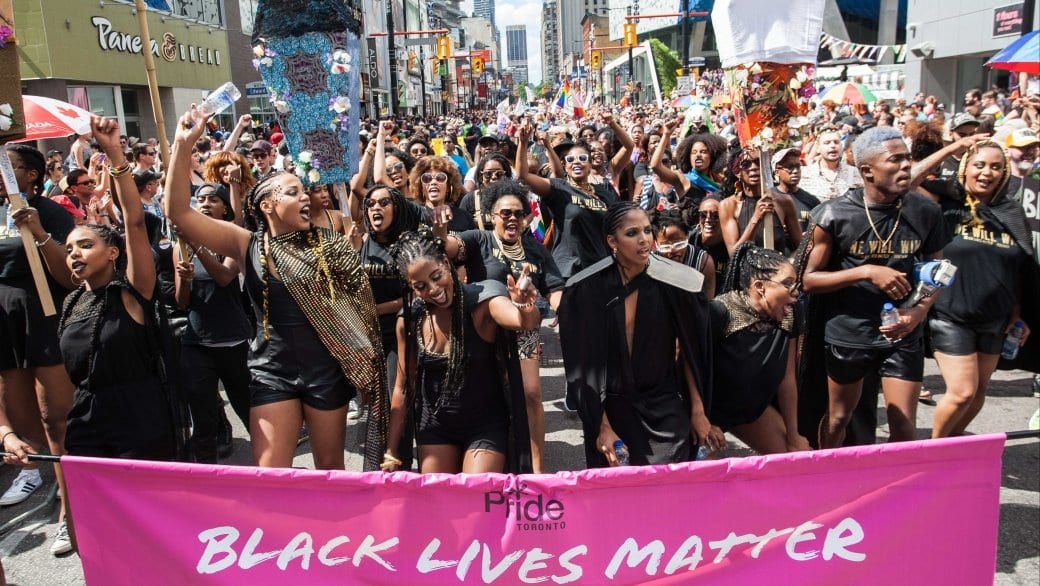Pride Toronto has agreed to sweeping changes after a Black Lives Matter Toronto protest brought this year’s parade to a halt.
Mathieu Chantelois, Pride Toronto’s executive director, agreed to a list of demands that includes excluding any police floats in future parades, more diversity in staffing, the return of a South Asian stage, a commitment for more black ASL interpreters and increased funding, support and autonomy for Black Queer Youth, Blockorama and other community spaces.

The nine demands made by Black Lives Matter during the Toronto Pride parade. (Black Lives Matter Toronto/Facebook)
The agreement came after a tense standoff when BLMTO, this year’s honoured group, stopped the parade for nearly 30 minutes, waiting for its demands to be met.
“Even though we are celebrating Pride, and giving folks the opportunity to live their life, there’s still a group — black folks and people of colour — who are still very much criminalized for their queerness and are not safe,” Alexandria Williams, a co-founder of BLMTO, told Daily Xtra, before the parade.
BLMTO, which is organized by mostly queer and trans people, argued that Pride has historically marginalized the voices and spaces of black, indigenous and other non-white LGBT communities.
“You can wave your rainbow flags and you can have the time of your life,” Williams said during the protest. “But every time my partner walks out that door, I am afraid.”
Syrus Marcus Ware pointed to Blockorama, a Pride stage organized by Blackness Yes!, as indicative of the problem.
“We have been moved all over the site of this festival,” he said. “Our funding has not increased since 2006.”
Williams noted that the trans march, the Black Queer Youth stage and a two-spirit stage were all booked at the same time on Friday night.
“Do I have to choose an identity? Do I have to choose an intersection to celebrate my Pride,” she asked the crowd.
During the standoff, tensions grew in the crowd, with conflicting chants of “Black Lives Matter” and “move that bus.”
It was reminiscent of a moment a week earlier when BLMTO was shouted down by an “all lives matter” chant during a protest of a Toronto police mural unveiling.
But the protest during Pride came to an end when Chantelois signed off on the demands and hugged Rodney Diverlus, a BLMTO co-founder.
“Their requests were extremely reasonable,” Chantelois told the Toronto Star. “Everything was making a lot of sense.”
One of the demands that Chantelois signed off on included a town hall with BLMTO, Blackness Yes!, Black Queer Youth and others six months from now to update the public on the progress of their demands.

Black Lives Matter chanting as they marched down Yonge Street during the 2016 Toronto Pride parade. (Nick Lachance/Daily Xtra)
BLMTO’s demand to end the official police presence in Pride came during a parade that had more police, both marching within and patrolling throughout, than ever before due to the presence of Prime Minister Justin Trudeau and concern over an Orlando-style attack.
Pride Toronto traces its origins back to an anti-police uprising following Operation Soap in 1981, when hundreds of gay men were arrested by Toronto Police in a co-ordinated raid of four bathhouses. The Stonewall Riots, which many Pride parades commemorate by celebrating in June, were also an anti-police uprising, led primarily by black and Latinx trans women.

The Black Lives Matter Toronto float commemorated fallen queer and trans black folks including Sumaya and Sakia Gunn. (Nick Lachance/Daily Xtra)
Why Black Lives Matter is Toronto’s Most Effective LGBT Movement

 Why you can trust Xtra
Why you can trust Xtra


